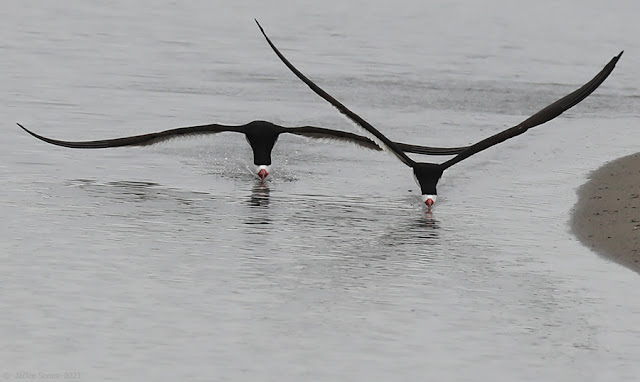A few more photos of two Black Skimmers (Rynchops niger) in Bodega Harbor yesterday (10 June 2023). Although a small number of Black Skimmers nest in south San Francisco Bay, they are more common in southern California, so it was fun to spend a few minutes with them.
Most of the images I have show the skimmers skimming. This is a highly specialized feeding technique — dropping the lower mandible into the water while in flight, hoping to make contact with a fish.
First, here's a photo where you can see the difference in length between the upper and lower mandibles:






Jackie! As usual, stunning photos.
ReplyDeleteDespite my 67 years in SF Bay Area, I've never seen these birds before, and wasn't aware of their feeding habits.
It looks challenging, and maybe pretty tiring, especially when feeding a family, but it also looks fun.
Obviously it works, and their specialized equipment for this method is
so elegant, as your photos show us.
Thank you, once again, for sharing your knowledge and it's beauty with us!
Thanks!
ReplyDeleteSkimmers didn't start nesting in South SF Bay until 1994, so it's not surprising that many people haven't encountered them yet. And in all of California there are only about 1200 pairs or so (the last estimate I saw, might be more now?), primarily in Southern California, so they're not common.
I used to see them on the East Coast, but I've only seen them a few times in Bodega Bay, so it's always a treat!
Jackie
The quality of photographs you post is just outstanding! You’ve captured their grace and beauty.
ReplyDeleteI miss seeing skimmers. In my early days in SoCal, we’d see them near lagoons and river mouths.
Thank you for sharing your knowledge and remarkable photography. It’s a treat to live(work) vicariously through your sightings :-)